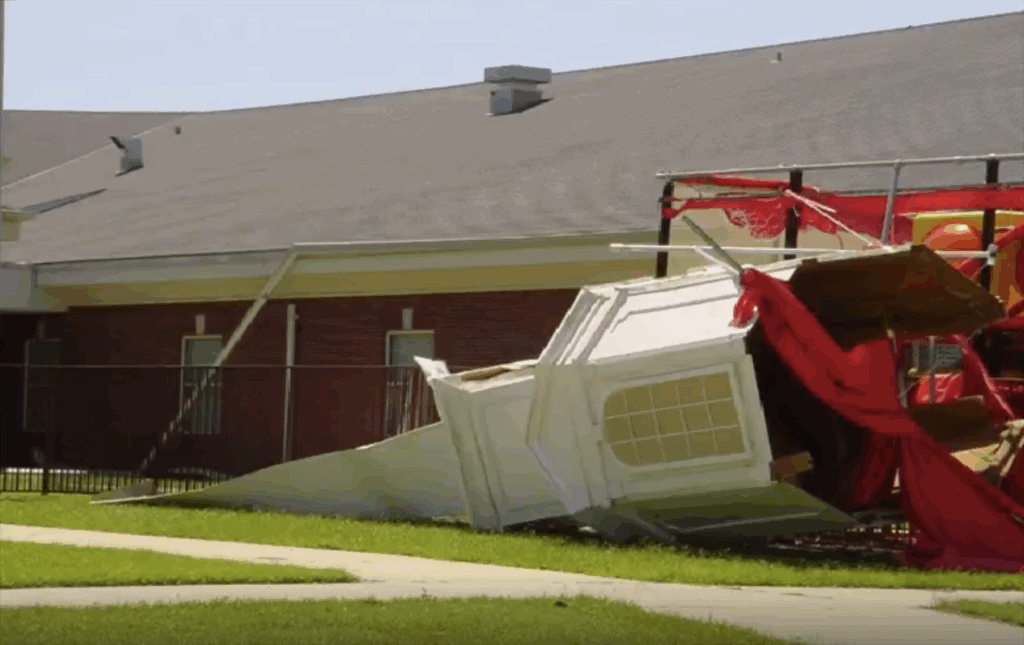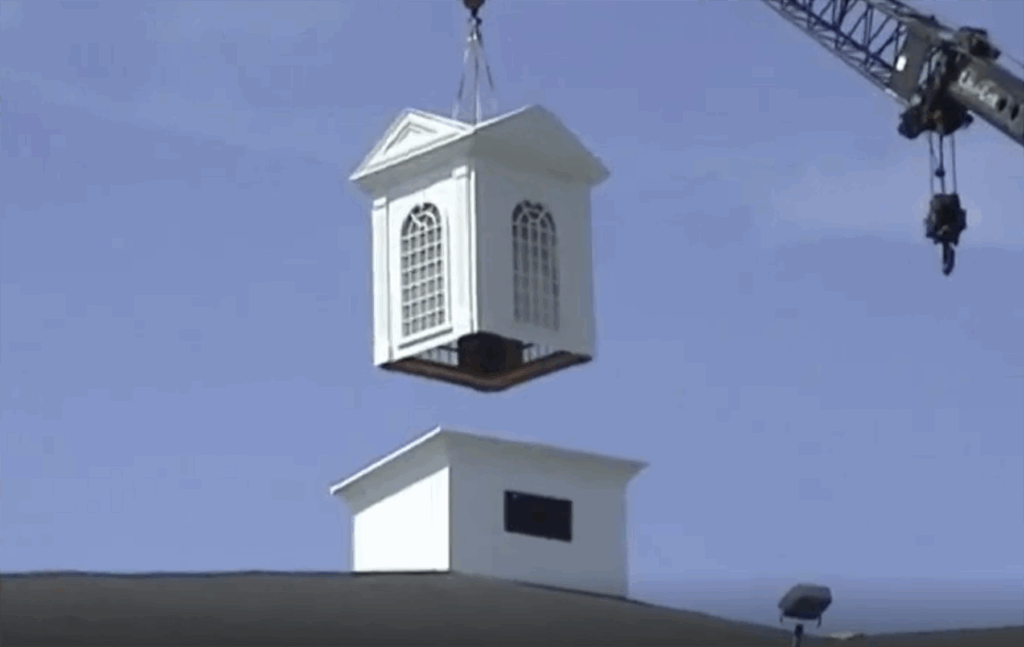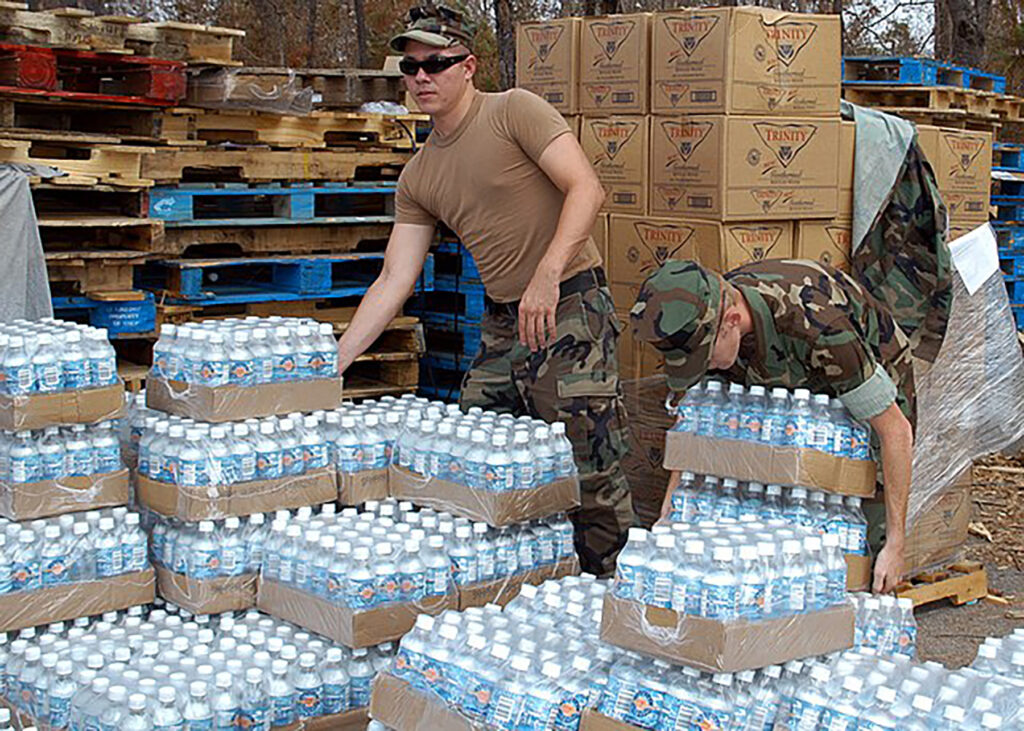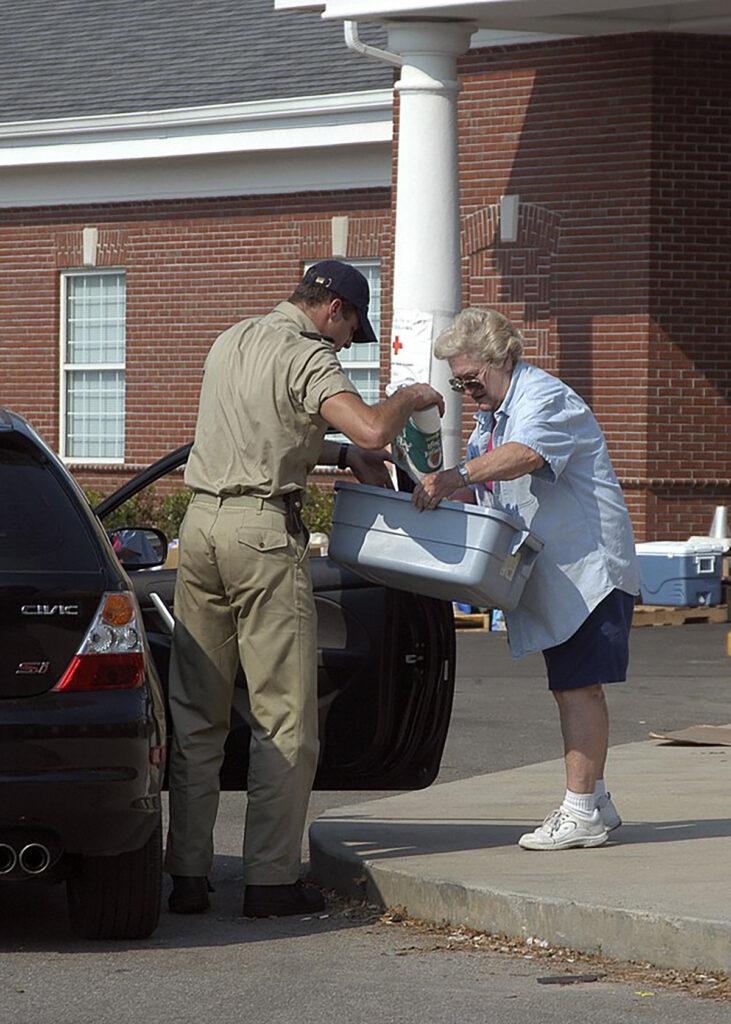‘Blessed Be Your Name’: Twenty years later, First Church, Biloxi, pastors reflect on Katrina
By Lindsey Williams
Writing Specialist
Monday, August 29th, 2005 – a date marked in history for the homes leveled to their foundations, for the lives lost, and for the unimaginable scars left behind. But for First Church, Biloxi, the days after stand as an immovable testament to God’s faithfulness.
Smokey Gibson, current Senior Pastor of First Church, Biloxi, and Student Pastor at the time of Hurricane Katrina, said of the weekend leading up to the impact, “I remember Sunday morning realizing this was going to be a big storm and we pleaded with our church family to consider evacuating. Many who had ridden out storms before chose to stay. My family and I traveled to Meridian to ride the storm out and wait to see the impact. In the days after, we were in shock to see how bad it really was.”
“When you live on the coast, you’re used to hurricane scares,” said Chip Stevens, Senior Pastor of First Church, Jackson, and former Senior Pastor of First Church, Biloxi. “Looking back, a lot of people ask, ‘Why didn’t more people leave?’ Well, we were used to false alarms. It is laborious to board up your house, so you get wary of it. With Katrina, we didn’t realize how destructive it would be.”
On the preceding Friday, the church staff and their spouses were away at an annual retreat in New Orleans, unaware of the growing threat in the Gulf. That evening, Stevens received a call from his church secretary asking if plans for a staff celebration on Sunday night were changing due to the incoming storm.
“We turned on the news and realized this was bigger than we thought, so we canceled the rest of the staff retreat. Sandra (Stevens’ wife) and I drove home that night, and as we passed my neighbor’s house, who was a hurricane hunter pilot, I noticed his home was boarded up. Things weren’t looking good.”
The next day, Stevens sent his wife and their three small children to her mother’s home in Hazlehurst, as he and a friend boarded up the house. He called many pastors that night to confer whether First Biloxi should offer their usual Sunday morning services. Each pastor responded affirmatively with their own plans to continue with service.
Stevens awoke early in the morning to the news channel stating that all church services on the coast had canceled. With no way to send word out quickly enough, Stevens and the few remaining staff members continued with the early morning service, after which they closed the building. He then drove through hours of arduous traffic to join his family.

Both Stevens and Gibson recall watching the destruction of familiar places on the news. “Even though most of the wind damage was west of us,” said Gibson, who waited in Meridian with his wife and toddler, “the storm surge was so destructive to so many neighborhoods behind the church. Our church was spared catastrophic damage, only losing the steeple and minor roof damage.
“Most of the damage to physical property was minor in our neighborhood, but the emotional was much worse. The storm was not a respecter of our status, our wealth or poverty, or our religion. In the days ahead, I saw people with nothing walking through lines for food and water, and people with great financial means in those same lines, because the storm truly humbled us and reminded us that we are all in this together.”
Before widespread use and easy access of social media, student ministry was difficult in the following months. Families of First Biloxi were scattered across the States due to loss of housing and basic services.
“Our ministry consisted of lots of emails and eventually one of our members helped us set up a chatroom for students to check in and stay connected,” said Gibson. “We had no cell service, and for the first month, many of my family thought that I had not made it out alive. When we finally got service back, I had voicemails from frantic friends and family. We felt cut off and helpless in those first few months.”
After losing power in Hazlehurst, Stevens moved his family to live with his sister in Jacksonville, Alabama.

“I really didn’t know what to do next,” said Stevens, “but I went down to the coast and was able to get to our house, which only had minor wind damage, and then the church. The Mississippi Baptist Disaster Relief crew was in the parking lot and they had things rolling. So I visited church families in the area and checked in on them.
“But I remember just being in shock and not knowing what I was supposed to do. I called Jim Futral (Executive Director-Treasurer of the Mississippi Baptist Convention Board at the time) and he really encouraged me. I decided to make sure my family was okay, and that I could make my way back to the church before the next Sunday. Disaster Relief was just such a blessing. This was going to be the long haul, and they were committed to it.”
Confirming his decision, when Stevens returned to his family, he pulled up his email to find that people all over the country were emailing him as the pastor, because they were not able to get ahold of their parents or grandparents. Incredibly, the church members they asked about were the same families he had just visited, and he was able to give relieving reports.
The first Sunday back, the church put on a service under the building’s portico, in the early September humid heat.
“Some people brought lawn chairs, some sat on the curb, and some stood. One of our ministers, who had lost everything, shared a testimony. That is a worship service I will never forget,” Stevens emphasized. “A lot of people were wearing clothes they had worn for days and clothes they had received from Disaster Relief. There was a lot of pain, but there was a lot of joy in the midst of that.

“Because most of our staff was not able to get back, and a few had lost everything, the only one who could play music was an intern with his guitar. I will never forget the song he chose to play: ‘Blessed Be Your Name.’ I look around and I see these people singing at the top of their lungs, ‘You give and take away, but my heart will choose to say, Lord, blessed be Your name.’”
In the days following the storm, First Church, Biloxi, became a ministry hub of recovery and rebuilding, housing SBC Disaster Relief, Red Cross, International Relief, and many other groups. Volunteers worked at the church every day for months, distributing water, food, and supplies to thousands of people in need.
“One day, we had a celebrity entourage at the church,” said Gibson, “and they asked me who our corporate sponsors were. I told them we didn’t have any and that all the supplies they saw were donated by churches and Southern Baptists. They were floored that people would do that.”
People poured in to help from everywhere. Stevens even remembers both Mexican and Dutch military units in the church parking lot, aiding in handing out supplies and cleaning up.

“You read Old Testament stories of provision and think, ‘Man, I’d like to see something like that.’ As difficult as it was, there was no question that the hand of God was in the midst of that. We were living in that Old Testament provision.”
In response to how he ministered to people through this time of heavy discouragement, Stevens put it simply: “Just preaching God’s Word. God’s Word is just always right. God’s Word always speaks right where we are. It was just a matter of listening and loving, which is what ministry is, right? It’s not near as much about what you say, as much as it is just being there and listening and praying. In times like that, you learn real quick that ministry is not about the programs. When the programs are all taken away, when they are all gone, you remember that ministry is about loving people.”
One day after the storm, Gibson recalled being the only pastor on campus when a distress call was sent out over the church radio about a woman in tattered clothes in the main foyer threatening to slit her wrists with a knife.
“She was crying and screaming, saying the hurricane was her fault and that all the destruction was caused because of her,” Gibson said. “She said God was punishing everyone because of her lifestyle. When I asked why, she handed me her driver’s license. Her name was Katrina.”
After sharing with her that God doesn’t respond to our lack of faith and lifestyle in the way she believed, Gibson and a couple of female volunteers prayed over her. The women then took her to get some needed supplies while Gibson continued to help the thousands of other people on campus.
“A few hours later,” Gibson continued, “I was in another building when a woman ran up to me and hugged my neck, thanking me for being there. To be honest, I didn’t know who she was. Then I saw the same ladies who had taken Katrina to clean her up, walking up and smiling. It was Katrina. She was totally different. This was a reminder that the love of Christ can change us inside and out. It has shaped even how I do ministry 20 years later.”
Today, Gibson is mindful that the church is not just the building but the people, and that the priority will always be relationships and serving one another.
“Those that are in our midst who walked through those days, understand the difficulties and blessings we saw back then,” Gibson said, “and I think it is what guides us today as we serve as a beacon on the Gulf Coast.”